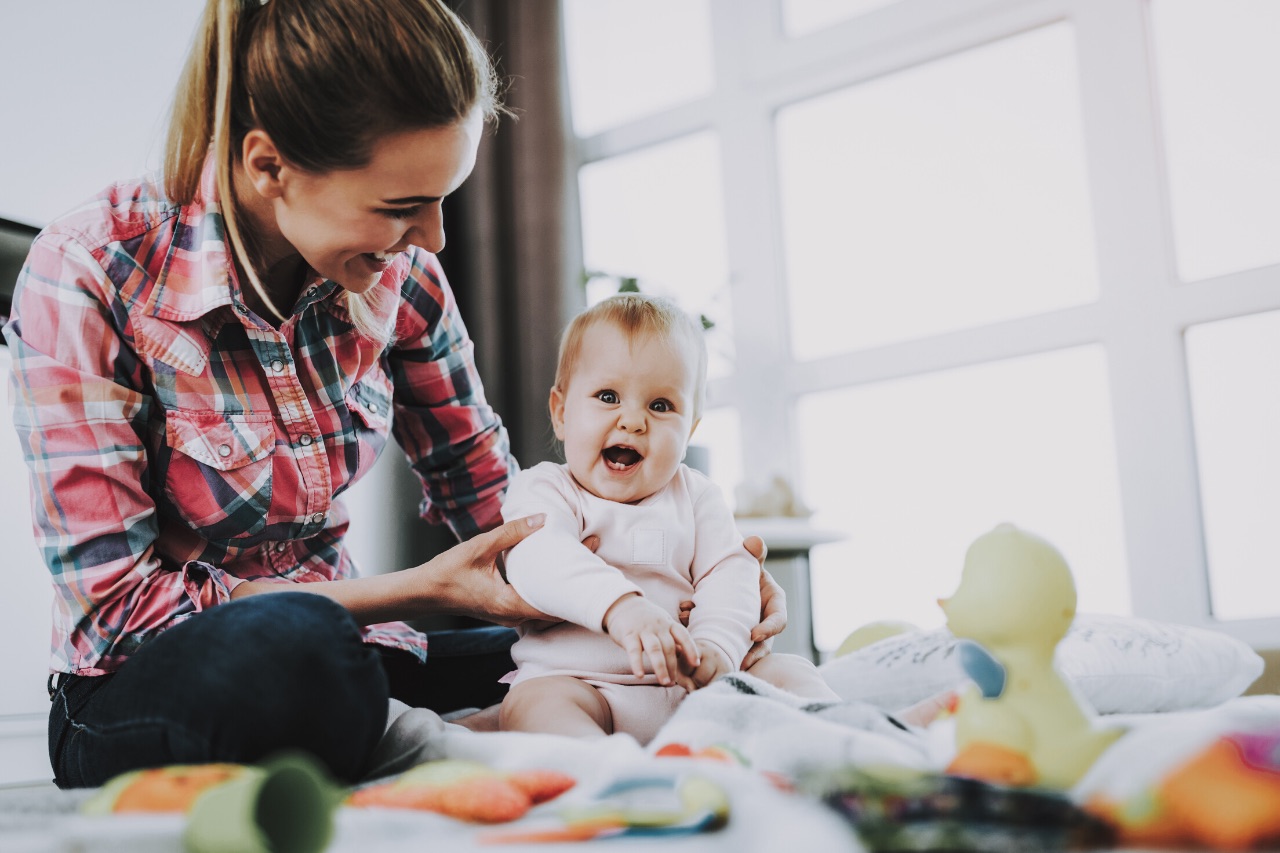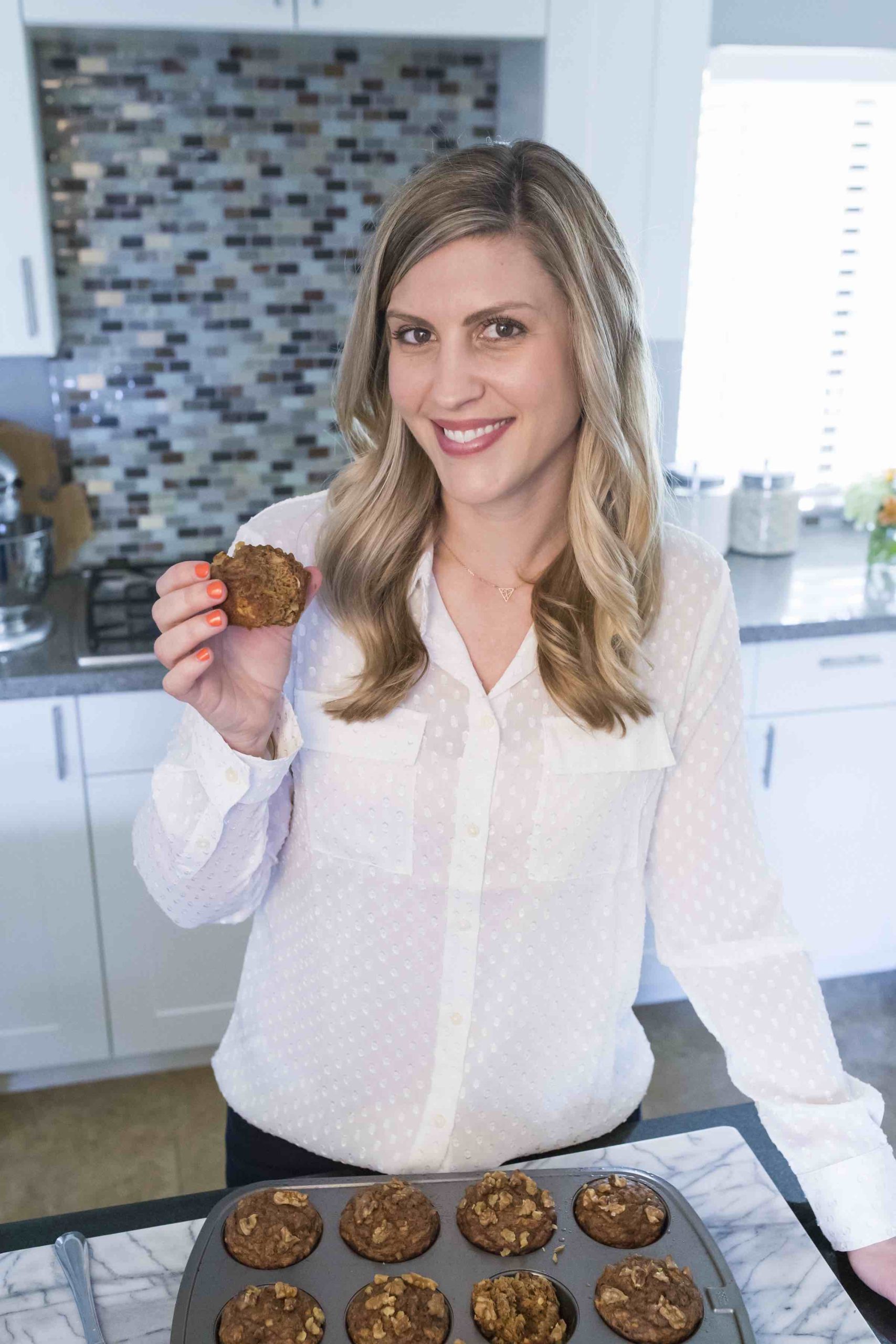Both the American Academy of Pediatrics and the World Health Organization recommend introducing solids or complementary feeding around 6 months when you see signs baby is ready for solids. Being developmentally ready looks different for each individual baby, this is why getting to know your baby’s cues is important.
If you are getting ready to start your baby on solids, you can download this free getting started with solids guide to help you out.
It’s important to note that your baby’s age and developmental readiness are not the same things. Make sure your baby is showing the signs of developmental readiness before you start solids.
When my daughter was nearing 6 months old, I could hardly contain my excitement to start her on solid foods. As a dietitian, it was something I had been dreaming about for a very long time. But despite her age, at 6 months, she was still not ready. Her readiness signs for solids were not quite there.
My daughter was born at 36.5 weeks, and, even though that doesn’t seem “early” most of her developmental milestones were delayed. So, for her, using her adjusted age helped with understanding her development.

Table of Contents
Using adjusted age for starting solids
When you are getting ready to start your baby on solid foods, that is a developmental milestone. So, like other milestones, the age of your baby comes into play. Adjusted age is simply subtracting the weeks born from the 40-week due date. Developmental milestones are age linked and predictable (though there is a range), so a baby born early will likely not hit the same milestone at the same time as a baby born on the same day but past their 40-week due date.
This is when adjusted age comes into the picture.
So, for my daughter, 40 weeks-36.5 weeks=3.5 weeks early. We knew she would essentially be around 3.5 weeks (almost a month) behind on most of her developmental milestones. While every baby is different, she tracked very accurately with her adjusted age.
Starting solids was no different. At 6 months old, she was just starting to be able to sit up kind of independently (one of the readiness signs.) We didn’t actually start her on solids until a few weeks later.
Can a 4-month-old eat baby food?
At one time, starting solids around 4 months (or earlier) was very common. However, things have changed.
Many parents link their baby’s lack of sleep and fussiness around the 4-month mark to hunger, however, poor sleep and fussiness at 4 months is a different developmental milestone. This is not a sign your baby is ready for solids. Putting cereal or other solids into the baby’s bottle will not reduce the fussiness or lack of sleep at this age since it is not related to hunger. Breastmilk or formula still meet 100% of the baby’s nutritional needs at this age.
Starting a baby on solid foods too early (before 4 months) may increase their risk for food allergies, gastrointestinal problems (due to a lack of development) and increase the risk of obesity later in life.
The newest recommendation from both the American Academy of Pediatrics and the World Health Organization is to start babies on solids around 6 months when they are showing signs of developmental readiness.
Some babies will show signs before 6 months and some slightly after. I have seen this in babies I have worked with, however, starting at 4 months of age without the signs of readiness present is not a good idea. Most babies show all the readiness signs closer to the 5-6 month mark.
Signs baby is ready for solids
When your baby is close to the 6-month mark, start watching for signs baby is ready for solids. This will look slightly different for every baby, but there are many common signs you can look for.
- Ability to hold their head up, steady, independently
- Sitting up by themselves, or with minimal assistance
- The absence of the tongue thrust (tongue moving in and out)
- Picking up toys and bringing them to their mouth
- Grasping items in the balm of their hand with more control
- Being interested in table food and grabbing for your plate when you eat
Conclusion
When it comes to starting your baby on solids, there are a number of things to consider, but their readiness is the most important. Understanding the key signs of readiness will help you feel confident when you are getting started. It is important to remember that all the readiness signs need to be present, not just one or two.
Your baby showing interest in table food while you eat but not being able to sit up mostly independently means they are likely not ready to start solids. Remember, there is no rush! Most of their nutrition is coming from breastmilk or formula when first starting so be sure they are truly ready to start.
Need more help getting started, my comprehensive e-guide “Balanced from Baby’s First Bite” will walk you through all the steps you need to take when getting ready to start your baby on solids. Learn more here.


This is exactly what I needed to read! My son was also born 36.6 weeks and he just turned 6 months but he doesn’t seem to be ready for solids. My mother in law insists that he needs to be eating cereal and other foods and even my pediatrician mentioned beginning solids because he’s 6 months old so I’ve been feeling the pressure but I just felt that he still isn’t ready. Now I don’t feel bad for not having started already!
Hi Katie,
Yes! Your intuition is correct, you need to be confident he is ready, that is based on development, not just age alone. One thing to keep in mind… Babies do start to lose iron stores starting around 4 months. Babies born early don’t always get as much iron from their mama either because a lot of the transfer happens in the last trimester (and with delayed cord clamping). If you plan to wait until closer to 7 months and you are breastfeeding, you might consider an iron supplement until he is eating a bit of iron-rich foods. (The American Academy of Peds recommends iron starting at 4 months but not all docs recommend this. It isn’t always needed) An iron-fortified formula should have enough until solids are started.
Hi!
Which baby cereal do you recommend (Not rice based)? There are so many brands and I’m a first time Mama!
Thanks!
Lydia
Hi Lydia,
I like the iron-fortified baby oatmeal. The one I used (and liked most) was the Happy Baby Organics oats and quinoa, but they make several different varieties. I still use it for baking different items for my toddler and recommend it to many clients for adding to muffins, pancakes etc. Have you seen the recipe for my 4 ingredient pancakes for babies? Thanks! Jessica
Thanks for this post! I definitely think I need to wait a few weeks longer based on the info. I have a 5.5 month old, but he was born at 39 wks and doesn’t seem ready (as opposed to how my first born presented at this age).
Any recommendations for a cereal that is not rice or oatmeal based for when we are ready? I’m 99% sure my baby is sensitive to oats and I’d rather avoid rice due to arsenic.
Hi Megan,
I would have a chat with their doctor about the sensitivity to oats to determine if that really is the case. But, I do know there are some quinoa-based fortified infant series that you may be able to try.
Thank you so much for your content. I’m a first time mom and an RD but I never had any peds training in my internship. So I’m very thankful for a resource on infant nutrition that aligns with my intuitive eating values.
Can you elaborate on why baby needs to be sitting up independently or with minimal assistance? How is this linked with solid food readiness? My baby turns 6 months in a couple days, shows all the other signs, was was born at 40 weeks 4 days, is working on sitting up and can last on her own for about 5-10 seconds before needing minimal support to continue sitting. i assume that doesn’t meet the sitting independently criteria. Where is the evidence for this recommendation? Seeking a resource to have a discussion with my pediatrician who goes by 6 months age as the rule. Thanks!!
Hi Ali,
Great question thanks for asking this. I’m glad raising an intuitive eater is one of your goals 🙂 For sitting independence. They don’t need to be 100% able to sit on their own non-stop, but you want them to have enough trunk strength and control to maintain a good upright position without flopping/leaning. This is for the safety of swallowing and also for their ability to get food to their mouth in a safe way. This is especially important if you are following the baby-led feeding method and starting with solids/self-feeding. It sounds like your baby is ready/close to, 5-10 seconds sitting is a pretty good time frame. When you put her in her high chair be sure to use the shoulder harness and have something for them to rest their feet on for stability (no dangling feet). You can prop slightly by rolling towels and placing them on either side to help with stability even more. Age isn’t a perfect predictor. I had a friend with a baby who was sitting totally on their own around 5 months, hit all their milestones ahead of average and was ready before 6 months. Other babies are not ready until 6 months and 3 weeks for example. Starting solids is so fun! Be sure to check out my starting solids guide if you want even more information on starting or feel free to reach out 🙂